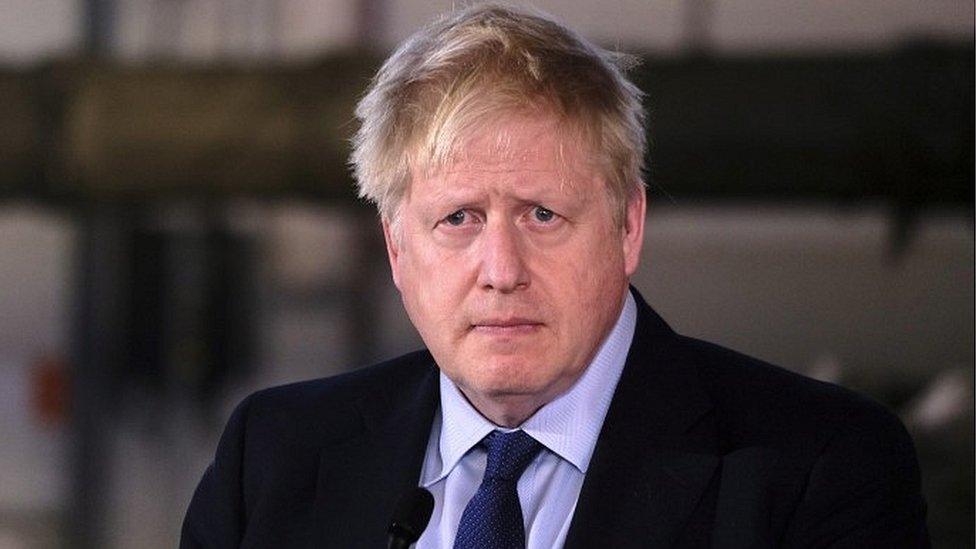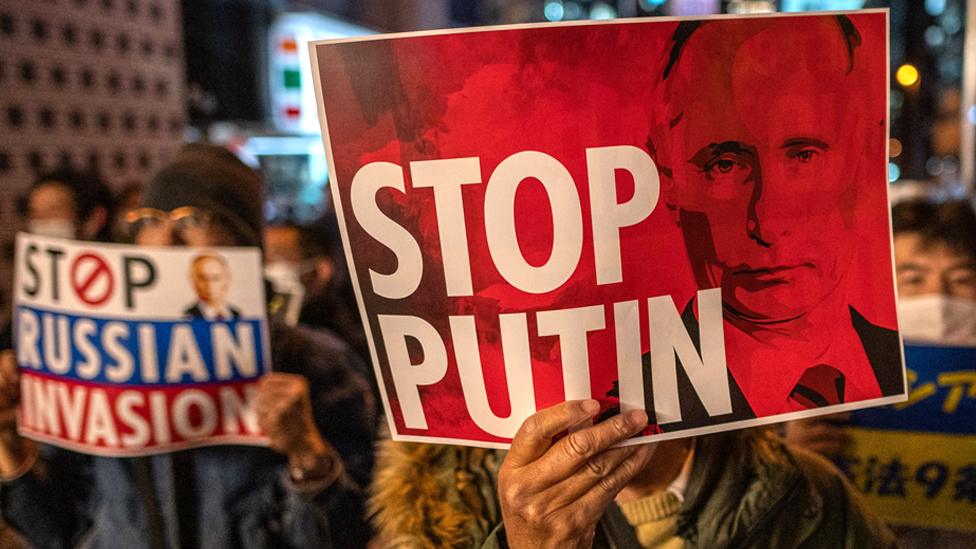War in Ukraine: UK promises quicker sanctions against Russian oligarchs
- Published

Boris Johnson says allies of Vladimir Putin will have "nowhere to hide"
The government is to change the law to make it easier to introduce sanctions against Russian oligarchs, after criticism the UK is acting too slowly.
Ministers are tabling amendments to the Economic Crime Bill which are designed to allow the UK to align with penalties imposed by allies in the EU and US.
Prime Minister Boris Johnson said foreigners trying to launder money in the UK would have "nowhere to hide".
But Labour accused the government of making a "U-turn under pressure".
Ministers have already imposed asset freezes on individuals and companies with links to Russian President Vladimir Putin, following the invasion of Ukraine over a week ago.
But opposition parties have said the government needs to do more to tackle wealthy Putin allies who store large amounts of money in London.
There has been criticism from within the Conservative party too.
Senior Conservative Tom Tugendhat said he was "extremely concerned" that the delays in imposing sanctions might allow people who have stolen from the Russian people for the last 20 years to hide their money in a new jurisdiction. That would be completely unacceptable, he told BBC Radio 4's Today programme.
The bill, which has cross-party support, is expected to be fast-tracked through Parliament on Monday.
Outlining its amendments, the Foreign Office said the "appropriateness test" - a threshold that needed to be met when imposing sanctions on individuals - would be removed.
It is also speeding up the deadline for overseas companies to declare their true owners - from 18 months to six months. Maximum fines for non-compliance with this rule are set to increase from £500 to £2,500 per day.
The bill is expected to become law by the middle of this month.
Mr Johnson said these measures would ramp up the pressure on criminal elites trying to launder money on UK soil and close the net on corruption. "They will have nowhere to hide," he warned.
In a video on Twitter, external addressed to the Ukrainian people, Mr Johnson said the UK, along with its allies, would continue "doing everything we can to support you and impose a mountain of pressure on Vladimir Putin".
He said they would go further with sanctions "unless and until this aggression stops".
"The world is turning its back on Putin and his regime," he added.
In a call with French President Emmanuel Macron on Friday evening, the prime minister described the crisis in Ukraine as "the worst war on our continent for a long time".
And, in an interview with European newspapers La Repubblica, Die Welt and El Pais, Mr Johnson said he believed Mr Putin intended to "double down" on the invasion because Mr Putin envisaged no way out but to "continue with the destruction".
He went on to describe the moment he was woken in the middle of the night to the news of the attack on the Zaporizhzhia nuclear site, the likes of which he said were "clearly a matter of our common European health and safety".
He said it must be made clear to the Kremlin that "a civilian nuclear disaster in Ukraine, another Chernobyl, is a disaster for Russia as well as for everybody".
Watch: Zaporizhzhia nuclear plant appears on fire after shelling (3 March 22)

Russia attacks Ukraine: More coverage
THE BASICS: Why is Putin invading Ukraine?
SCENARIOS: Five ways the war in Ukraine might end
INNER CIRCLE: Who's in Putin's entourage, running the war?
IN DEPTH: Full coverage of the conflict

On the sanctions proposals, shadow foreign secretary David Lammy welcomed the government's "U-turn". But he added it was unacceptable that oligarchs with links to Mr Putin, who should have been sanctioned, had been allowed to move money around because of government incompetence.
The law should have been introduced months ago, at the same time as allies and partners had done so, he said.
Recent research by campaign group Transparency International, external suggests £1.5bn worth of UK property has been bought by Russians accused of corruption or links to the Kremlin since 2016.
Since the invasion began, the UK has announced a series of sanctions on Russian banks, oligarchs and businesses.
On Thursday, two more oligarchs were sanctioned - Alisher Usmanov, who has links to Everton football club, and former Russian deputy prime minister Igor Shuvalov.
Other measures include asset freezes on Russian banks and an export ban on technical equipment.
Related topics
- Published4 March 2022
